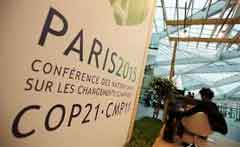In just a few weeks, a conclave that could dramatically impact the practice of supply chain management - in fact, also how we lead our daily lives - will take place in Paris.
The 2015 UN Climate Summit will kick-off Nov. 30. The results are likely to be momentous in many ways, including for the supply chain.
There are so many tentacles to what may happen here that it is extremely difficult to make clear sense of it all, but I am going to try my best.
Gilmore Says: |
 Exactly ZERO companies at the Penn State meeting by a show of hands thought their companies were considering Green issues with regards to growing ecommerce channels. Zero. Exactly ZERO companies at the Penn State meeting by a show of hands thought their companies were considering Green issues with regards to growing ecommerce channels. Zero.

Click Here to See
Reader Feedback |
Let's start why there is such a focus on - and from a Green perspective the critical importance of - this year's annual UN conference.
In Copenhagen in 2009, reaching a global agreement relative to reductions in CO2 emissions proved beyond the possible. But what could be reached that year was an agreement to reach an agreement, with a commitment of sorts that 2015 would be the year such a grand global deal would be concluded.
So there is tremendous pressure to make that happen in Paris in a few weeks.
I almost don't know where to go from here, but let's start with this: As I have emphasized for a number of years (somewhat alone), the entire supply chain world changes when and if there is an actual cost for carbon emissions by companies.
Today, many companies have decided that reducing carbon emissions is a smart strategy for themselves. Fortunately, for now most of those initiatives produce some level of ROI, and in many cases a solid return, as reducing CO2 generally comes from reducing use of costly energy such as truck fuel or electricity to power factories.
But the key point is that these efforts are voluntary - a company itself decides how much effort and investment to make to reduce CO2. So Walmart a decade or so ago decided to move sustainability (including reducing CO2 emission levels) to the forefront of its corporate strategy, reducing some of its costs for sure but also reaping a PR bonanza, as the retail giant adroitly moved from a corporate pariah for many on the left to Green superstar.
Arch rival Amazon, on the other hand, while I am sure is pursuing a number of Green practices, has obviously been much less aggressive in such efforts, at least from a PR perspective and I think in actual practice.
There are so many complexities here. First, ROI from CO2 reduction varies depending on external factors, such as the price of oil/diesel. Returns are far less with oil under $50 per barrel than they were at $100+.
From a pure business theory perspective, companies need to analyze not only the return from a CO2 reduction initiative, but how that return compares to other opportunities to employ resources and capital, though that approach is often not followed in the current focus on the Green supply chain.
Second, it is clear many companies are implicitly factoring in a return from some kind of customer/consumer preference for reductions in CO2 emissions, i.e., customers will favor the products from companies that are aggressive on sustainability.
At a B2B level, we can see that for sure through sustainability scorecards for vendors by Walmart, Procter & Gamble, and others said to impact sourcing decisions (though let's be honest, how much impact there really has been is very unclear).
The impact is even less clear at the B2C level. Will consumer really pay more - and if so, how much more? - for the Green product? Will consumers really prefer the product that has the lower carbon footprint?
There are many consumer surveys that say Yes, in the abstract. Others have been less positive. But how that plays out at the "moment of truth" at the store shelf remains a huge unknown. Is your family looking at CO2 emissions as you throw products into the retail shopping cart? Neither are we. It takes long enough to get through the new giant Kroger's and wait in the POS queues as it is.
Third, conveniently often ignored, there is a huge difference between reducing carbon intensity - CO2 emissions per some metric, like units produced or sold - and an absolute reduction in CO2. The former is of course much easier to achieve than the latter.
In a 2014 Wall Street Journal interview with then just retiring Walmart CEO Michael Duke, the reporter noted that Walmart's total greenhouse gas emissions had actually grown since 2005, as mitigation efforts simply can't keep up with Walmart's overall business growth globally.
"There's nowhere in our strategy that says we want to shrink the company. We still want to keep growing," Duke answered sensibly
A couple of weeks ago, I attended a meeting of the Penn State Supply Chain Leaders Forum, with a theme of omnichannel commerce. During a group discussion session, one attendee asked a very interesting question: Are ecommerce orders less CO2 efficient than traditional purchases at physical retail stores?
Well, I must first say I would guess Yes, but have taken a note to look into this in more detail, as I have no idea by how much. To illustrate the complexity of all this, the answer of course would in part depend on what kind of vehicle UPS or FedEx uses for consumer delivery - diesel, natural gas, hybrid or electric.
It all actually sometimes makes my head hurt.
More importantly, exactly ZERO companies at the Penn State meeting by a show of hands thought their companies were considering Green issues with regards to growing ecommerce channels. Zero.
So back again to the main point. All this is fluid and determined by individual companies, in the US at least, under the current status quo. But that could all change if the US agrees in Paris to a reduction in CO2 emissions that is ultimately achieved through putting a price on carbon.
 If there is a price on CO2, then the dynamic instantly changes from companies deciding on their own what CO2 reduction strategies they will pursue, based on their own calculus of the explicit and implicit returns, to one where the CO2 costs become real and (perhaps) dynamically quantifiable. A price on carbon means it will have to be factored in for a huge percent of supply chain decisions, starting with network design. If there is a price on CO2, then the dynamic instantly changes from companies deciding on their own what CO2 reduction strategies they will pursue, based on their own calculus of the explicit and implicit returns, to one where the CO2 costs become real and (perhaps) dynamically quantifiable. A price on carbon means it will have to be factored in for a huge percent of supply chain decisions, starting with network design.
That price on carbon - designed obviously to make its sources more expensive for business and consumers and thus reduce demand - can come from either a "cap and trade" system, where in effect permits for CO2 emissions are created by the government and then bought and sold in electronic markets - or a direct tax on carbon sources, such as diesel fuel.
One huge issue for cap and trade is that governments are reluctant to really enforce the system. Almost 20 years of such a system in most of Europe has done almost nothing to reduce CO2 emissions there- it's really been something of a giant fraud, as countries don't want to make their manufacturers uncompetitive.
A carbon tax is more effective for sure - but what price generally (cost to the economy) and specifically (what would be the cost of CO2 emissions per metric ton, impacting say gasoline prices) would be politically acceptable?
There is more hair on all this. In the US at least, if "legally binding," a UN agreement would be considered a treaty and thus require approval of two-thirds of the Senate, a dubiously proposition. Non-binding may be more likely.
Next, developing countries are demanding huge billions in annual payments in support of "climate justice" - saying they need the money to move directly to non-carbon fuels unlike the path developed economies such as the US have taken. Developed countries have vaguely committed to $100 billion annually for such a fund in 2020, though where the money will actually come from is hugely unclear.
Developing country leaders, salivating at the potential windfall that would enrich many, in turn say the $100 billion isn't close to enough, seek trillions in "climate reparations." This issue actually could derail the whole UN agreement.
Relatedly, regardless of what is agreed to in Paris, will China, India and others really follow through on commitments to reduce CO2 to levels that combined with developed country reductions will somehow limit total CO2 emissions to levels some say will keep temperatures from rising more than 2 degrees Celsius from pre-industrial levels? The simple and obvious answer is No, they won't.
I have no idea what will happen in Paris. There will be huge pressures to find an agreement of some kind, no matter how bogus, and I believe they will. It won't change China and India's direction at all, but it could certainly impact our supply chain costs and strategies here.
I will let you know what happened in a few weeks. It likely will be an inflection point in the history of supply chain management. In an ironic side note, the US is on pace for selling a record number of autos in 2015, it was reported this week - led of course by a surge in truck and SUV purchases.
What do you expect to happen coming out of this year's UN Climate Summit? What will be the supply chain impact? Let us know your thoughts at the Feedback button (email) or section (web form) below.

|